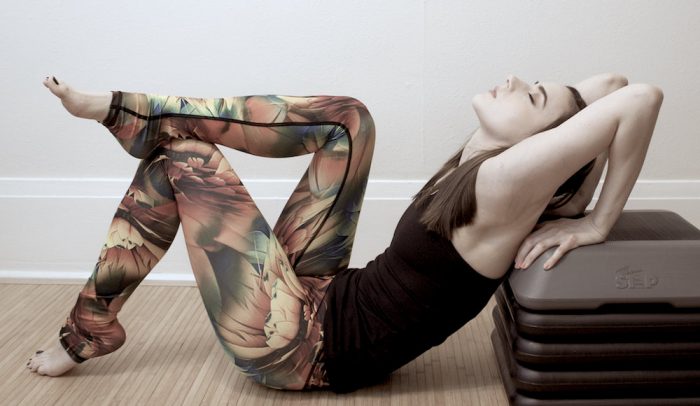“Yoga is not a work-out, it is a work-in. And this is the point of spiritual practice; to make us teachable; to open up our hearts and focus our awareness so that we can know what we already know and be who we already are.” ~ Rolf Gates
~
To most of the Western world, yoga looks like exercise—making shapes on a mat.
The physical practice of yoga varies from highly strenuous to deeply relaxing, depending on the style. When practiced regularly, yoga will undoubtedly tone muscles, strengthen bones, improve flexibility, and reduce stress.
On the other hand, there’s the idea that yoga is a “work-in.” The implication here is that yoga is more of a spiritual and mental exploration than a physical one, that to focus on the physical is to miss the point. There’s truth in this sentiment; yoga can be much more than physical poses on the mat.
But what if yoga is both a workout and work-in?
We are integrated beings—mind, body, and spirit. What challenges our body also challenges our mind and soul. What soothes our soul comforts our mind and body. What quiets our mind stills our body and soul. Yoga invites us to work on all facets of our being at once, giving us the opportunity to integrate and align all three components.
Yoga is a Microcosm of Life
When we come to yoga, we meet ourselves on the mat. What shows up on our mat is a microcosm of our greater life.
Chronic stress? That frustration will show up on our mat. Conflict at home? That struggle will manifest itself in our yoga practice. Reoccurring patterns and habits? Those appear on the mat, too. Yoga illuminates the truth that no matter where we go, there we are.
When we practice yoga, we must choose to accept what is in front of us or not. We can grit our teeth, avoid, deny, and try to escape, or we can move and breathe through the emotions and anything else that shows up. Yoga offers a safe space to work through those emotions, to work with what is.
Learning to accept and work with whatever shows up on the mat is no picnic. Challenging emotions, bodily limitations, frustrations—they all come up in practice. It took me years to recognize that what happened on my mat reflected what was happening in the rest of my life. But once I made that connection, I discovered that the grace found within my yoga practice could also be found beyond my yoga practice.
Kindness and compassion discovered on the mat will eventually extend outward to others. Joy found in our bodies on the mat can be celebrated there and beyond. Learning to listen to our bodies on the mat, we learn the wisdom of allowing instead of forcing—not just in yoga but everywhere in life.
If we let it, our yoga practice can hold up a mirror and illuminate what we fear, avoid, and deny. In discerning whether to face a challenge or back away from it on the mat, we’re able to recognize our fears and those things that hold power over us. By tapping into greater body awareness, we become more sensitive to where we store tension, stress, and trauma in our bodies. The continual feedback loop between mind, body, and spirit can teach us a great deal about ourselves if we’re open to listening.
Yoga Meets Us Where We Are
Showing up on the mat, we learn to be fully present in our body, mind, and soul. Our bodies, emotional state, and energy level feel different each time we come to the mat. How we feel on the mat is affected by the time of day, weather, season, previous activity, and many other factors. Since each practice is unique, we are best served by staying present in our bodies and accepting what is.
On a Saturday morning, we might feel energetic and want a vigorous, sweaty Vinyasa practice full of dynamic movement. After a hectic workday, it may feel more natural to lean toward a slower, more restorative practice that allows the body to relax and gradually deepen into poses. If an injury or physical limitation is present, there may be certain poses unavailable to you, but there are always other options or modifications for any circumstance.
Herein lies another beautiful truth about yoga: yoga meets us where we are, as we are. The practice never asks more than our honest, authentic effort.
Relinquishing Control
Yoga teaches us to relinquish control over outcomes and let go of our ego’s need for constant recognition. By working with what is available to us on any current day, we receive the benefits of the pose regardless of how “advanced” the pose is. One of my favorite yoga teachers often says in class, “There’s no prize for being able to do this pose.” That simple phrase makes me laugh for trying so hard to force myself into certain poses, because she’s right—there is no prize.
Accepting that the progression of my yoga practice isn’t always linear was a tough lesson to learn, but learning that opened up a world of freedom. For example, one day I might easily find my way into a challenging post like Bird of Paradise. On a day when my hamstrings and hips are tight, that pose might not be available to me. Yoga taught me to choose wisely—either forcing my way into the pose and potentially hurting myself, or staying present, listening to my body, and opting for what’s best for me that day.
You’ll often hear yoga teachers say, “The most advanced version of a pose is the one that’s appropriate for you today.” This sums it up perfectly, because it requires us to stay present and tap into what’s right for us as individuals in that given moment.
Taking Yoga Off the Mat and Into Your Day
“Yoga is not merely touching your toes, or standing on your head, or folding yourself into a lotus pretzel. It’s about how you do what you do, and how you live your daily life on a moment-to-moment basis.” ~ Erich Schiffmann
Learning to take our practice off the mat and into the rest of our day is the point at which we fully integrate yoga with all aspects of our being. This allows us to use our yoga practice for the benefit of everyone, not just ourselves. If each of us feels better in our body, more complete in our soul, and steadier in our mind, we can be of greater service to the world and to others.
There are many styles of yoga, all of which have great benefits for all aspects of our being. I encourage everyone to explore different styles and find what feels good. Regardless of the style, yoga will strengthen and lengthen muscles, improve bone density, and cultivate greater fluidity in our bodies.
If we choose to show up fully, yoga will do the same for our minds—it will nourish and comfort our souls. If we are brave enough, yoga will hold up a mirror to who we are. It will shine a light on our struggles, our blockages, those things we’d rather not face.
It’s up to us whether we want to face the truth of who we are, but it’s also an invitation to a journey of self-discovery and truth.
So, is yoga a workout or work-in? The truth is, it’s truly both.












Read 11 comments and reply